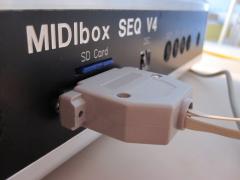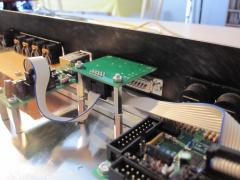-
Posts
15,248 -
Joined
Content Type
Profiles
Forums
Blogs
Gallery
Everything posted by TK.
-
Beta25 is available now: o now each OSC port has an individual configuration set which consists of the Remote IP, Remote Port, Local Port and Transfer Mode o an OSC Transfer Mode has been added, it can be configured in the network configuration page for each OSC port. In MIDI mode, all events generated by the track will be embedded into a 'm' type packet. This mode allows to tunnel MIDI events via ethernet to a proxy which runs on the host (or any device which is able to convert these messages) In "Text Msg (Integer)" and "Text Msg (Float)" mode, the OSC packets will be encoded the following way: - Note Events: /<chn>/note <note> <velocity> Integer: note and velocity in range 0 .. 127 Float: note still as integer, velocity in range 0.0 .. 1.0 - Poly Pressure Events: /<chn>/polypressure <note> <pressure> Integer: note and pressure in range 0 .. 127 Float: note still as integer, pressure in range 0.0 .. 1.0 - CC Events: /<chn>/cc <cc-number> <value> Integer: value in range 0 .. 127 Float: cc-number still as integer, value in range 0.0 .. 1.0 - Program Change Events: /<chn>/programchange <value> Integer: value in range 0 .. 127 Float: value in range 0.0 .. 1.0 - Aftertouch Events: /<chn>/aftertouch <pressure> Integer: pressure in range 0 .. 127 Float: pressure in range 0.0 .. 1.0 - Pitchbend Events: /<chn>/pitchbend <value> Integer: value in range -8192..8192 Float: value in range -1.0 .. 1.0 <chn> range: 1..16 o OSC option now supports SysEx transfers (SysEx stream is embedded into blobs) o it's now possible to route USB/MIDI/IIC/AOUT ports to the OSC ports in the MIDI Router page. o SysEx streams will now be forwarded by the MIDI Router as well. The Chn setting has to be set to "All" for source and destination port. This allows you to access the SysEx functions of your synth - it's even possible to upload a new firmware to a MIDIbox which is connected to a MIDI port of MBSEQ now. o MIDI->Misc menu: BLM can now be assigned to an OSC port [/code] Especially the SysEx forwarding function has been requested by multiple people. The OSC add-ons are only for nerds ;) Best Regards, Thorsten.
-
Such a function isn't available yet, and it will be some work. But I will add it sooner or later, because it definitely makes sense! :) Best Regards, Thorsten.
-
finally! :sweat: Best Regards, Thorsten.
-
Hi, which MIOS and midibox_808 firmware version are you using? Best Regards, Thorsten.
-
I guess that Wilba is currently on vacation - be patient, he will come back! ;) Best Regards, Thorsten.
-
Hi Tobias, thank you for releasing the windows driver! :) I would like to test it, but don't know how to use the RTP-MIDI protocol on iPad. Are there undocumented functions available in iOS, or did you implement the protocol stack for iOS as well? Best Regards, Thorsten.
-
No, thats uncritical. Hm, strange... it sounds like there is a power problem, e.g. Vss and/or Vdd between core and DOUT module not connected. This could cause such effects as well. Did you already check the connections between core and DOUT modules? Best Regards, Thorsten.
-
DA 10MM and DA 20MM I'm still working on the backpanel. Today I got an idea for solving the SD Card issue: by flipping the SD Card PCB inside the case there is no collision with the frontpanel LCD connector anymore. Disadvantage: the SD Card has to be inserted upside down (but thats acceptable for me) -> http://midibox.org/forums/index.php?app=gallery&module=images§ion=viewimage&img=470 Best Regards, Thorsten.
-
Fortunately there is enough clearance, see also: http://midibox.org/forums/index.php?app=gallery&module=images§ion=viewimage&img=471 MIOS (and MIOS32) can do this, but the software architecture of MBSEQ isn't designed for generating events with a period of less than 1 mS (1 kHz), because it needs this time for doing complex calculations on all 16 tracks. Best Regards, Thorsten.
-
From the album: TK: MBSEQ Aluminium Case
Due to special request: there is enough clearance between SD Card and the expansion port - it's possible to change the SD Card w/o disconnecting the D25 plug. -
From the album: TK: MBSEQ Aluminium Case
By flipping the SD Card PCB inside the case there is no collision with the frontpanel LCD connector anymore. Disadvantage: the SD Card has to be inserted upside down (but thats acceptable for me) -

Seq 3.4 Glide not working on following note with same value...
TK. replied to nuke's topic in MIDIbox SEQ
Ok, I remember why I inserted this special check: VST based instruments didn't play any note in this special case (ca. 4 years ago) - I guess that meanwhile most VST instruments should handle this case properly? Best Regards, Thorsten. -

Seq 3.4 Glide not working on following note with same value...
TK. replied to nuke's topic in MIDIbox SEQ
The code snippet above already points you to the file: SEQ_CORE_* functions are located in seq_core.inc Search for the label and you should know where a something has to be changed. But be warned: changes can lead to unwanted side-effects! Best Regards, Thorsten. -

Seq 3.4 Glide not working on following note with same value...
TK. replied to nuke's topic in MIDIbox SEQ
I checked the source code: there is an explicit check if the note is equal to the previous note; in this case a Note Off event will be sent before the note will be played again, accordingly glide won't be activated. SEQ_CORE_Clk_SendEvent_NoOff ;; current note != old note: play off event later for a proper legato movlw SEQ_TRKVARSTATEx bsf PLUSW2, SEQ_TRKVARSTATE_LEGATO SEQ_CORE_Clk_SendEvent_NoLeg [/code] So, it seems that this is the intended behaviour - but I don't remember why. Probably because a user complaint about it ;) (Please don't ask for an option to alternate this behaviour - you know that MBSEQ V3 has passed it's lifecycle...) Best Regards, Thorsten. -
I took all Rob Hubbard songs as reference, since I know these tunes since centuries. ;) Best Regards, Thorsten.
-
No!!! ;) This issue could be related to the wire impedance. How many DOUT modules are connected together, and how long are the cables? Best Regards, Thorsten.
-
Hi, yes, because the LED will be supplied through the pull-up resistor R6 yes, because the optocoupler consumes power. Best Regards, Thorsten.
-
Yes, MIOS32 should be portable to this controller. Best Regards, Thorsten.
-

Seq 3.4 Glide not working on following note with same value...
TK. replied to nuke's topic in MIDIbox SEQ
This issue seems to be related to the synthesizer you are using, because in suskey (also known as "fingered portamento")+legato mode it shouldn't retrigger the gate, regardless if the same note is played or not. Or maybe you haven't enabled legato mode on your synthesizer? In Mono mode it would always retrigger the gate independent from the note value. Best Regards, Thorsten. -
Nice work, your implementation looks less dirty than my own one :) (some years ago I hacked the code directly into resid-builder, and MIDI data was output to /dev/midi) For writing into the waveform registers I'm using a different strategy, here an excerpt: // TK: this probably doesn't match with the way how the original ASID software handles the second // waveform register set - but I find it useful this way // strategy: whenever the two sets are allocated, shift the 2nd one to the first entry... // this ensures, that the two last waveform changes take place // write to waveform register? check if first set is already allocated if( mapped_addr >= 0x16 && mapped_addr <= 0x18 && asid_reg[mapped_addr] & 0x100 ) { // switch to second waveform register set mapped_addr += 3; // if this one is allocated as well, copy the old one to the first set if( asid_reg[mapped_addr] & 0x100 ) asid_reg[mapped_addr-3] = asid_reg[mapped_addr]; } [/code] Here the code of an overworked version if you would like to compare the methods (but it's for the MacOS based SidPlay) http://www.ucapps.de/tmp/asid/ASID_MIDI.m Best Regards, Thorsten.
-
Thanks for the enhancement! :) Could you please change SV8 to a 5x2-pin socket header? The layout should match with J11 of the MBHP_CORE_STM32 module (MIDI Link port). MI2 and MO2 can be used as spare pins. Just to ensure a certain consistency. The BLM socket and the surrounding circuit should use Vdd from this 5x2 pin socket, and not from somewhere else, so that it is possible to supply the BLM from a dedicated PSU if required. Vss should be connected together with the ground of the IIC circuit In order to make it more clear, I created a schematic for this circuit http://www.ucapps.de/midibox_blm/blm_connector_mbseq.pdf Please note: the socket is drawn from the rear side, I'm not sure if this is also the case in your schematic (check with the layout view) And btw.: a typical error is that people swap the MIDI IN/OUT pins when working with Eagle (ask Smash or Nils ;)) - please doublecheck the pinning with existing MBHP_* layouts. (Update: I compared your layout with the MBHP_IIC_MIDI PCB, it seems to be correct) Best Regards, Thorsten.
-
Yes, if you have the possibility it would be better. J5A/B/C (Gates/Clk) and J19 (AOUT interface) I'm using the same pin layout as on my MB6582, so that I can connect the same breakout-box Best Regards, Thorsten.
-
-
And here another idea: since the BLM will require an additional optocoupler and some resistors (a common TTL->MIDI IN and OUT circuit), these components could be added to the PCB as well (if still possible) Best Regards, Thorsten.
-
There are some new pictures: http://midibox.org/forums/index.php?app=gallery&module=user&user=3436&do=view_album&album=65 Note that they are commented. Best Regards, Thorsten.




